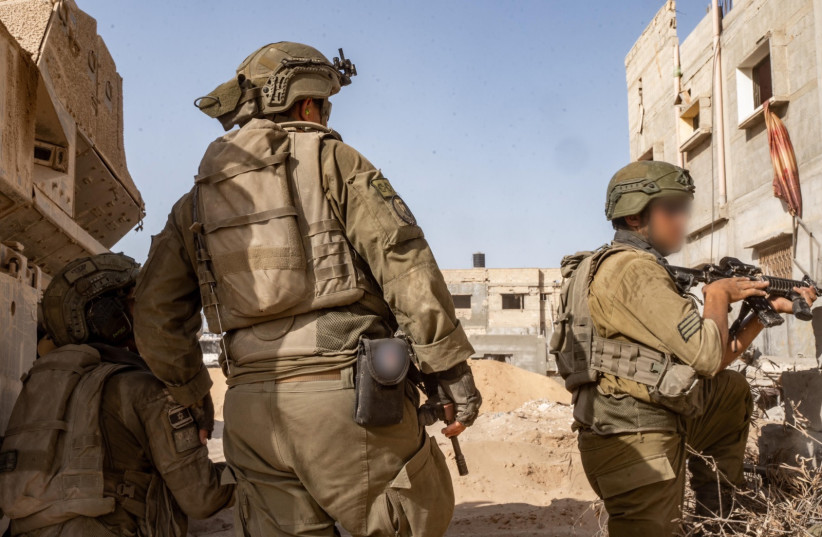Hamas managed to fire 20 rockets from Khan Yunis into Israel for the first time in months on Monday, as the IDF was trying to wrap up the larger and more intense fighting stage of the war.
The IDF withdrew from Khan Yunis in southern Gaza on April 7, and since then, it has been an open secret that Hamas has been returning to the area in large numbers.
But until Monday, there was hope that the IDF’s systematic destruction of rockets and rocket-launching platforms would prevent any larger barrage of rockets from places it had already been through.
Apart from a brief period in early May, when the IDF first invaded Rafah, and Hamas responded with several days of increased rocket fire from Rafah specifically, there has been very little rocket fire from Gaza since January.
According to an IDF statement on Monday, some of the rockets were intercepted, while others landed in open areas near the Strip.

The Eshkol Regional Council reported a similar number of rockets being fired at the area, but noted that nearly all had fallen in open areas.
“About 18 rockets were launched into our territory. Most of them fell in open areas outside the communities, and one rocket was successfully intercepted by the Iron Dome,” the Council reported. “One of the rockets fell in the area of Kibbutz Holit’s fence.”
The Eshkol Regional Council includes territory stretching from the border with Egypt and Gaza to north of Kibbutz Be’eri.
The rocket attack caused no injuries, and the IDF said it responded with artillery fire, striking the sources of the launches.
Earlier, the rockets triggered sirens in the Israeli communities in the area.
These sirens first blared in Nir Oz and Ein Hashlosha at 7:57 a.m. local time before being triggered several more times in various communities, including Ein Hashlosha.
In Shejaia in northern Gaza, the IDF continued a second invasion of the area, which it started this past Friday, having taken control of the area back in January but then leaving it shortly after.
IDF Division 98 carried out a number of raids and found significant quantities of Hamas weapons.
The military also noted that the Israel Air Force (IAF) struck many targets, eliminating about 20 terrorists and demolishing manufacturing facilities and warehouses.
In Rafah, forces of the Nahal Brigade, under the command of the 162nd Division, identified a terrorist who launched an anti-tank missile toward them. He was subsequently struck by an IAF aircraft.
Sergeant Ori Itzchak Hadad, 21, from Beersheba, from the 931st Battalion of the Nahal Brigade, fell in combat in the southern Gaza Strip, the military said on Monday.
Another soldier from the Nahal Brigade sustained severe injuries during the incident in which Hadad fell He was evacuated to a hospital for medical treatment.
Separately, the IDF added that on Sunday, in central Gaza, troops of the 99th Division identified a terrorist who had fired a mortar at them. An IAF aircraft eliminated him, the IDF noted. There were no injuries to IDF forces during that incident.
IDF in the West Bank
IN THE West Bank, a military vehicle drove over an explosive device in the Nur Shams camp in the Palestinian city of Tulkarm. The incident occurred during IDF operations in the area, during which the forces were reportedly targeted by more explosives.
The IDF had not disclosed what had happened to the soldiers by press time.
Later, the Palestinian Health Ministry, based in Ramallah, stated that a “child” and woman had been killed.
An additional four people were reportedly wounded by Israeli fire.
The ministry did not comment on the age of the child or whether those reportedly killed or wounded were engaged in attacks on the Israeli personnel operating in the area.
Attacks and counterattacks in the North
In the North, the IDF and Hezbollah continued a pattern of significant but contained attacks and counterattacks.
Following alarms in Ma’ayan Baruch at 5:31 p.m. Monday, five Hezbollah rockets crossed into the Galilee from Lebanon and fell in open areas; no casualties were reported, the IDF announced Monday evening.
Additionally, after alarms were activated in Ramot Naftali at 4:23 p.m. and in Dovev at 5:03 p.m., a Hezbollah rocket crossed into Israel from Lebanon and fell into an open area. Again, no casualties were reported.
Additionally, a mortar made a direct hit on a house in Metulla on Monday afternoon. For unexplained reasons, no siren was activated in the area. However, there were no reports of damage or casualties.
Earlier on Monday, Israeli Air Force fighter jets attacked two Hezbollah military buildings, where terrorists were operating in the areas of Aitaroun and Ayta ash Shab in southern Lebanon, as well as military buildings and terrorist infrastructure in the areas of Markaba, Houla, and Kfarkela in southern Lebanon.
The air force also attacked a Hezbollah military building in the Blida area of southern Lebanon when some Hezbollah terrorists entered, the military said on Monday.
Earlier on Monday, the military said its jets had struck other Hezbollah military targets in southern Lebanon overnight, including military structures in the Kfarkela area and terror infrastructure in the Houla, El Biyada, and Rab El Thalathine areas.
In addition, the military noted that IDF artillery forces fired at the Al-Dahira area to remove a threat.
